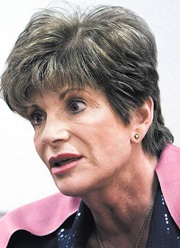Wednesday, March 3, 2010 | 2 a.m.
Related stories
- Nevadans support Democrats' strategy on health care (2-26-2010)
- A Vegas-style gamble on Obama’s agenda (2-25-2010)
- Harry Reid: 'There is no rush' on health care reform (1-26-2010)
- As attention shifts from health care, a new focus for Washington: Jobs (1-25-10)
- Reid, Democrats consider health care reform options after losing supermajority in Senate (1-21-2010)
- Senate casts historic vote on health care reform (12-24-09)
- Harry Reid casts ‘no’ vote as joke — maybe (12-24-09)
- How Reid handled health care (12-24-09)
- Road to health care reform still has obstacles (12-24-09)
- Senate clears a final procedural hurdle to health care reform (12-23-09)
- Health coverage requirement raises constitutionality debate (12-23-09)
- Reid bobs and weaves to land health care deal (12-22-09)
- GOP to keep up its fight until the final deadline (12-22-09)
- Deal-making gets job done, Reid says (12-22-09)
- Obama welcomes ‘historic’ health care advance (12-21-09)
- Jim Gibbons attacks Harry Reid on health care bill (12-21-09)
- Health care bill clears tough Senate test (12-20-2009)
- Health care compromise gives sweet Medicaid deal to Nebraska (12-20-2009)
As President Barack Obama outlines today the next steps in health care reform, all eyes turn to the House, rather than the typically testy Senate, as the chamber facing the steepest climb to pass a comprehensive bill.
The slim margin that House Speaker Nancy Pelosi leveraged to pass the $1 trillion House health care bill in November has evaporated as her chamber prepares a possible vote on the less-costly but less-popular Senate legislation. Retirements, death and the loss of the lone Republican backer have diminished Democrats’ odds.
Many House Democrats, including Nevada Reps. Shelley Berkley and Dina Titus, do not like the Senate bill. The promise that it will be changed in subsequent legislation and through the reconciliation process brings only scant comfort.
Still, as November’s midterm elections approach, House Democrats are faced with two unsavory options: pass a bill they may not like or pass nothing at all.
“People feel like you’ve got to get something done,” Titus said last week as she and other Democrats gathered to celebrate passage of one small piece of health care reform — a bill that revokes the insurance companies’ antitrust exemption. “I feel that way.”
Republicans are capitalizing on this scenario, gearing up for campaign slogans to match either outcome — Democrats are do-nothings who, with control of the House, Senate and White House, failed to accomplish their goals, or they must answer for passing a health care bill the public has not yet embraced.
Sen. Mitch McConnell of Kentucky, the Republican leader, warned Tuesday of the campaigns to come. “I want to assure our Democratic friends that if they are somehow able to pass this bill in the House, it will be the issue in every race in America,” he said.
Titus and Berkley were both yes votes the first time around, contributing to the 220-215 victory when the House bill passed in November.
But both Nevadans have expressed deep skepticism with the Senate version of the bill, which they may now be asked to consider. They are particularly opposed to the Senate’s plan for a 40 percent excise tax on high-end health care plans — the so-called Cadillac plans enjoyed by unions, including those representing workers on the Strip.
“I don’t like an excise tax,” Berkley said.
Republican Rep. Dean Heller voted against the bill and is likely to do so again.
The White House and labor unions negotiated a new version of the Cadillac tax in January that did not snare as many workers, and Obama’s blueprint released last week pushed the tax threshold even higher so that it would hit those with plans valued above $10,200 for singles and $27,500 for families.
Titus said the president was moving in the right direction.
“Even though I don’t like taxing benefits ... that’s certainly an improvement over the Senate bill,” Titus said. But the changes have not sealed her support.
Polls show Nevadans overwhelmingly want changes in the health care system, but do not support the current legislation.
Figuring into the political calculations, the go-it-alone strategy by Democrats is a politically dicey one. A Gallup Poll last week shows Americans nationwide are opposed to using the majority-only reconciliation process to pass the legislation without Republican support. Yet polling in Nevada by Research 2000 shows a majority, 55 percent, supports a go-it-alone strategy by Democrats.
The math in the House is further vexed by the abortion issue. The House was able to win passage of its bill last year by including restrictions on federal funding for abortion, an amendment that is not included in the Senate bill. The House could lose several anti-abortion Democrats on the matter.
What is unknown is whether the House could pick up some fiscally conservative Democrats who voted against the costlier House bill but might prefer the Senate version. Or whether Obama’s new proposal today could break through the unified Republican opposition — by including tougher provisions on medical malpractice reform or reining in medical fraud and waste, as had been suggested by Republican Sen. Tom Coburn of Oklahoma at last week’s health care summit.
As Democratic leaders shore up support for the president’s renewed push on his signature domestic priority, Berkley and Titus must decide whether to fall in line.
The two for months have been pushing their leaders to move away from health care reform and focus on jobs and economic issues that are tops on voters’ minds, especially in recession-battered Nevada.
Titus appears to be leaning toward supporting the bill’s passage, but she also thinks supporting pieces of health care reform, as she did last week in helping to pass the antitrust bill, would be an accomplishment.
Titus likely faces a difficult election in November, in a district with a strong independent streak. She won her first term in 2008 with less than 50 percent of the vote.
Titus withheld her support from the bill in committee until she could win concessions that allowed her to vote yes when it came to the floor. But withholding her backing now could mean the difference between passage and failure. She is waiting for the president’s next move before deciding whether to support the legislation.
Berkley faces an easier re-election in a predominantly Democratic seat in the heart of Las Vegas. She is less likely to withhold her vote from her party’s highest-profile issue.
“If we get 90 percent of what I want — this 100-percent-or-nothing is what puts our government in a gridlock — I’m not going down that path,” she said. “I’m trying to be as bipartisan and solution-oriented as possible.”



Join the Discussion:
Check this out for a full explanation of our conversion to the LiveFyre commenting system and instructions on how to sign up for an account.
Full comments policy